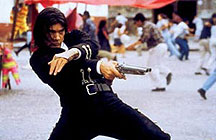|
|
|
|
Once
Upon a Time in Mexico
|
 |
|
If you want to judge the distance between a master and his disciple, compare the great Sergio Leone Westerns of the 1960s like The Good, The Bad and the Ugly (1966) with Robert Rodriguez's lame Once Upon a Time in Mexico. Leone, in his day, was accused of making superficial, cartoonish exaggerations of the Hollywood model – films lacking moral or artistic depth. How wrong that judgement looks now. At first glance, Rodriguez seems to be making all the right moves. There is the epic, heroic sweep of the camera movements, the angles that make his heroes and anti-heroes look like gods, the choreography of all action to a flamboyant and often amusing musical score. But today it is clear that Leone possessed what his imitators usually lack: a sense of politics. No matter how outrageous or convoluted Leone's plots became, he always held on to what was at stake in collective life-and-death struggles. By contrast, Once Upon a Time in Mexico is a charade where endless talk of The General, the Cartel, the Mob Boss, the cops, and especially that grand abstraction 'the people', never amounts to anything meaningful. The dialogue says it all. Scriptwriting is not Rodriguez's best suit, and this film is full of lumpy lines like "Are you are a Mexican or a Mexican't?" and "I don't think, I drink". The discussions of political revolution are no more eloquent. The story ostensibly centres on its glamorous hero, El Mariachi (Antonio Banderas), who is undergoing a rather uninteresting crisis about whether to avenge his murdered bride, Carolina (Salma Hayek), in the midst of a turbulent overthrow of the government. But Rodriguez is far more fixed on his prime villain, Sands (Johnny Depp), a CIA operative who walks the streets of Mexico wearing a CIA T-shirt, coldly killing anyone in his path while dispensing supposedly hardboiled witticisms. I am surely not the only viewer who is sick to death of these florid villains in contemporary movies who stride around quoting Homer or Nietzsche and behaving like editors of the Epicure pages of a bourgeois newspaper. What's worse, Rodriguez even tries to turn Sands into a figure of sympathy in the last half hour. After all, this poor American assassin has a soft spot for kids. Once Upon a Time in Mexico is the closest you can get to making a Western while ostensibly telling a modern-day gangster story. Rodriguez, however, seems constantly on the verge of turning the whole affair into a musical comedy. And this might have been the wisest move, since the film as it stands falls far short of its closest rival, Tarantino's stylish Kill Bill (2003/4). Like that movie, Once Upon a Time in Mexico tends to fragment into a string of attractions – a cameo from comedian Cheech Marin, an extravagant flashback to El Mariachi's blissful marital days, a couple of busy action set-pieces. But Rodriguez has lost sight of his trump card – the proud championing of Mexican popular culture that energised his earlier films like Desperado (1995). Now seemingly stuck with churning out re-treads of his former glories – another El Mariachi, another From Dusk till Dawn, another Spy Kids – Rodriguez is at a low point of his career. Like many of his generation, he needs some inspiration that does not derive solely from a callow love of other, better movies. MORE Rodriguez: Spy Kids 3D, Sin City, Four Rooms © Adrian Martin February 2004 |
![]()